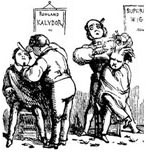
Average Is Not Normal
VITAL WORKS RECONSIDERED, #40
The Adventures of Huckleberry Finn. By Mark Twain.
The average and the normal are often confused. Whereas the normal signifies the way things ought to be, according to a fixed moral or divine standard — the ideal or most excellent — the average frequently denotes the lowest common denominator, the middle in the sense of mediocrity rather than the middle in the sense of the golden mean. The average can designate the prevalent opinions of a large percentage of people who are not qualified judges, or the blind customs or fashionable trends of thought or conduct at a given time. The appeal to the average can be an insidious tactic that detracts from the ideal of the saintly, the heroic, and the noble, and makes these norms appear fantastical and imaginary. It gives the impression that the many — a simple majority or a popular consensus — can determine moral, true, and right attitudes and behavior. The average man in the antebellum South, for example, defended the practice of slavery, just as the average man in twenty-first-century America endorses the contraceptive mentality and legalized abortion.
The institutions of modernity provide many examples in which the average seeks the status of the normal and natural, whereas it is, in fact, a deviation from and aberration of true standards and unchanging principles. In the world of higher education, for instance, the doctrine of relativism is the average point of view, and sexual license is given the status of acceptability when colleges establish co-ed dorms and provide contraceptives to students. In the realm of democratic capitalism, the unlimited pursuit and spending of money is an unquestioned tenet of the free-market system. In the social realm, the average family consists of two children, and, on average, nearly half of married couples divorce; the breaking of promises and vows thus comes to be viewed as standard conduct. The trends of “living together,” the postponement of marriage, and the view of marriage as any arbitrary arrangement are now understood as common features of modern life, distorting the distinction between the average and the normal. In the realm of religion, since the late 1960s and the publication of Bl. Pope Paul VI’s Humanae Vitae, the number of priests, bishops, and theologians who have dissented from the Church’s magisterial teaching gives the impression that large numbers of critics, rather than the supreme teaching authority of the Church, possess the power to determine right and wrong.
Average is a morally equivocal term that confuses the intrinsic meaning of normal and abnormal, natural and unnatural, right and wrong, noble and base, and knowledge and opinion.
Throughout his classic novel Huckleberry Finn, Mark Twain excoriates the “average man,” whom he portrays not only as a coward but also as a sentimentalist, a fool, and a sluggard. Huck Finn, the unassuming, innocent boy who becomes the noble hero of the book, avoids all these vices of Twain’s “average man.”
You May Also Enjoy
Karl Adam's great achievement is to remind us of the inexhaustible resources the Church possesses to carry out her task.
The classics could teach what virtue is, but they could not figure out a way to practice it. The Christian would argue for the help of grace. But even with grace things go wrong.
Tolstoy was a world-class novelist and a great and influential heretic: His avant-garde views heralded today’s liberal and relativistic Christians.

